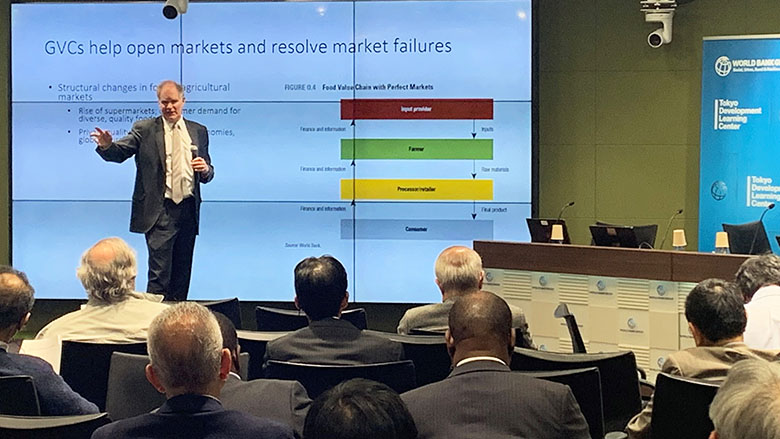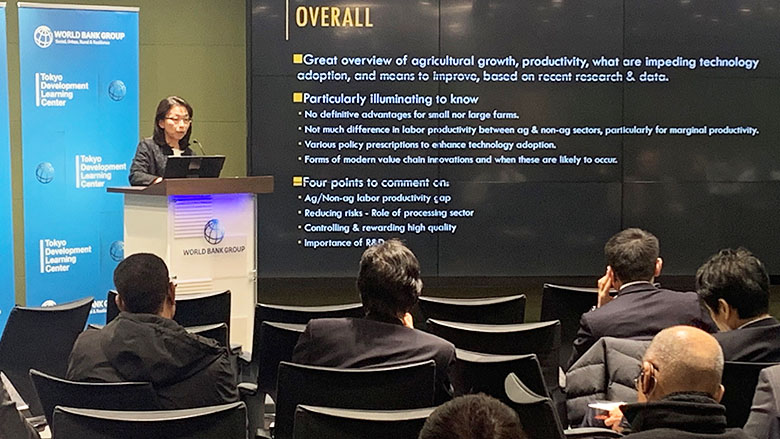 Fuglie, Keith; Gautam, Madhur; Goyal, Aparajita; Maloney, William F.. 2020. Harvesting Prosperity : Technology and Productivity Growth in Agriculture. Washington, DC: World Bank. © World Bank. https://openknowledge.worldbank.org/handle/10986/32350
Fuglie, Keith; Gautam, Madhur; Goyal, Aparajita; Maloney, William F.. 2020. Harvesting Prosperity : Technology and Productivity Growth in Agriculture. Washington, DC: World Bank. © World Bank. https://openknowledge.worldbank.org/handle/10986/32350
Technology is central to growth in agricultural productivity, yet across many parts of the developing world, readily available technology is never taken up.
The authors investigate demand-side constraints of the technology equation to analyze factors that might influence producers, particularly poor producers, to adopt modern technology.
Agriculture and food systems are rapidly transforming, characterized by shifting food preferences, the rise and growing sophistication of value chains, the increasing globalization of agriculture, and the expanding role of the public and private sectors in bringing about efficient and more rapid productivity growth.
In light of this transformation, the analysis focuses on the supply side of the technology equation, exploring how the enabling environment and regulations related to trade and intellectual property rights stimulate Research and Development to raise productivity.
The book also discusses emerging developments in modern value chains that contribute to rising productivity. This book is the fourth volume of the World Bank Productivity Project, which seeks to bring frontier thinking on the measurement and determinants of productivity to global policy makers.
 English PDF 271 pages
English PDF 271 pages English Overview 35 pages
English Overview 35 pages
Related: 9 December 2019. World Bank Tokyo Office. In September 2019, the World Bank published its fourth report, Harvesting Prosperity: Technology and Productivity Growth in Agriculture . The report’s lead author, William Maloney, Chief Economist for Fair Growth, Finance and Institutions (EFI), the World Bank’s Chief Economist for Growth, Finance and Institutions (EFI), held a seminar to introduce the main points of the report.
9 December 2019. World Bank Tokyo Office. In September 2019, the World Bank published its fourth report, Harvesting Prosperity: Technology and Productivity Growth in Agriculture . The report’s lead author, William Maloney, Chief Economist for Fair Growth, Finance and Institutions (EFI), the World Bank’s Chief Economist for Growth, Finance and Institutions (EFI), held a seminar to introduce the main points of the report.

The report states that developing countries need to dramatically expand agricultural innovation and farmers’ use of technology to eradicate poverty and respond to rising food demand and address the adverse effects of climate change.
Agricultural productivity growth has stagnated in recent decades, particularly in South Asia and Africa, where most of the world’s poor are living, and new ideas to improve farmers’ livelihoods are emerging. Be asked. According to the report, strengthening investment to generate and ensure the penetration of new knowledge can lead to a dramatic increase in agricultural productivity and, consequently, income.
Source: PAEPARD FEED
by secretary
by secretary
by secretary
by secretary
by secretary
by secretary
by secretary
by secretary
by secretary
by secretary
by secretary
by secretary
by secretary
by secretary
by secretary
by secretary
by secretary
by secretary
by secretary
by secretary
by secretary
by secretary
by secretary
by secretary
by secretary
by secretary
by secretary
by secretary
by secretary
by secretary
by secretary
by secretary
by secretary
by secretary
by secretary
by secretary
by secretary
by secretary
by secretary
by secretary
by secretary
by secretary
by secretary
by secretary
by secretary
by secretary
by secretary
by secretary
by secretary
by secretary
by secretary
by secretary
by secretary
by secretary
by secretary
by secretary
by secretary
by secretary
by secretary
by secretary
by secretary
by secretary
by secretary
by secretary
by secretary
by secretary
by secretary
by secretary
by secretary
by secretary
by secretary
by secretary
by secretary
by secretary
by secretary
by secretary
by secretary
by secretary
by secretary
by secretary
by secretary
by secretary
by secretary
by secretary
by secretary
by secretary
by secretary
by secretary
by secretary
by secretary
by secretary
by secretary
by secretary
by secretary
by secretary
by secretary
by secretary
by secretary
by secretary
by secretary
by secretary
by secretary
by secretary
by secretary
by secretary
by secretary
by secretary
by secretary
by secretary
by secretary
by secretary
by secretary
by secretary
by secretary
by secretary
by secretary
by secretary
by secretary
by secretary
by secretary
by secretary
by secretary
by secretary
by secretary
by secretary
by secretary
by secretary
by secretary
by secretary
by secretary
by secretary
by secretary
by secretary
by secretary
by secretary
by secretary
by secretary
by secretary
by secretary
by secretary
by secretary
by secretary
by secretary
by secretary
by secretary
by secretary
by secretary
by secretary
by secretary
by secretary
by secretary
by secretary
by secretary
by secretary
by secretary
by secretary
by secretary
by secretary
by secretary
by secretary
by secretary
by secretary
by secretary
by secretary
by secretary
by secretary
by secretary
by secretary
by secretary
by secretary
by secretary
by secretary
by secretary
by secretary
by secretary
by secretary
by secretary
by secretary
by secretary
by secretary
by secretary
by secretary
by secretary
by secretary
by secretary
by secretary
by secretary
by secretary
by secretary
by secretary
by secretary
by secretary
by secretary
by secretary
by secretary
by secretary
by secretary
by secretary
by secretary
by secretary
by secretary
by secretary
by secretary
by secretary
by secretary
by secretary
by secretary
by secretary
by secretary
by secretary
by secretary
by secretary
by secretary
by secretary
by secretary
by secretary
by secretary
by secretary
by secretary
by secretary
by secretary
by secretary
by secretary
by secretary
by secretary
by secretary
by secretary
by secretary
by secretary
by secretary
by secretary
by secretary
by secretary
by secretary
by secretary
by secretary
by secretary
by secretary
by secretary
by secretary
by secretary
by secretary
by secretary
by secretary
by secretary
by secretary
by secretary
by secretary
by secretary
by secretary
by secretary
by secretary
by secretary
by secretary
by secretary
by secretary
by secretary
by secretary
by secretary
by secretary
by secretary
by secretary
by secretary
by secretary
by secretary
by secretary
by secretary
by secretary
by secretary
by secretary
by secretary
by secretary
by secretary
by secretary
by secretary
by secretary
by secretary
by secretary
by secretary
by secretary
by secretary
by secretary
by secretary
by secretary
by secretary
by secretary
by secretary
by secretary
by secretary
by secretary
by secretary
by secretary
by secretary
by secretary
by secretary
by secretary
by secretary
by secretary
by secretary
by secretary
by secretary
by secretary
by secretary
by secretary
by secretary
by secretary
by secretary
by secretary
by secretary
by secretary
by secretary
by secretary
by secretary
by secretary
by secretary
by secretary
by secretary
by secretary
by secretary
by secretary
by secretary
by secretary
by secretary
by secretary
by secretary
by secretary
by secretary
by secretary
by secretary
by secretary
by secretary
by secretary
by secretary
by secretary
by secretary
by secretary
by secretary
by secretary
by secretary
by secretary
by secretary
by secretary
by secretary
by secretary
by secretary
by secretary
by secretary
by secretary
by secretary
by secretary
by secretary
by secretary
by secretary
by secretary
by secretary
by secretary
by secretary
by secretary
by secretary
by secretary
by secretary
by secretary
by secretary
by secretary
by secretary
by secretary
by secretary
by secretary
by secretary
by secretary
by secretary
by secretary
by secretary
by secretary
by secretary
by secretary
by secretary
by secretary
by secretary
by secretary
by secretary
by secretary
by secretary
by secretary
by secretary
by secretary
by secretary
by secretary
by secretary
by secretary
by secretary
by secretary
by secretary
by secretary
by secretary
by secretary
by secretary
by secretary
by secretary
by secretary
by secretary
by secretary
by secretary
by secretary
by secretary
by secretary
by secretary
by secretary
by secretary
by secretary
by secretary
by secretary
by secretary
by secretary
by secretary
by secretary
by secretary
by secretary
by secretary
by secretary
by secretary
by secretary
by secretary
by secretary
by secretary
by secretary
by secretary
by secretary
by secretary
by secretary
by secretary
by secretary
by secretary
by secretary
by secretary
by secretary
by secretary
by secretary
by secretary
by secretary
by secretary
by secretary
by secretary
by secretary
by secretary
by secretary
by secretary
by secretary
by secretary
by secretary
by secretary
by secretary
by secretary
by secretary
by secretary
by secretary
by secretary
by secretary
by secretary
by secretary
by secretary
by secretary
by secretary
by secretary
by secretary
by secretary
by secretary
by secretary
by secretary
by secretary
by secretary
by secretary
by secretary
by secretary
by secretary
by secretary
by secretary
by secretary
by secretary
by secretary
by secretary
by secretary
by secretary
by secretary
by secretary
by secretary
by secretary
by secretary
by secretary
by secretary
by secretary
by secretary
by secretary
by secretary
by secretary
by secretary
by secretary
by secretary
by secretary
by secretary
by secretary
by secretary
by secretary
by secretary
by secretary
by secretary
by secretary
by secretary
by secretary
by secretary
by secretary
by secretary
by secretary
by secretary
by secretary
by secretary
by secretary
by secretary
by secretary
by secretary
by secretary
by secretary
by secretary
by secretary
by secretary
by secretary
by secretary
by secretary
by secretary
by secretary
by secretary
by secretary
by secretary
by secretary
by secretary
by secretary
by secretary
by secretary
by secretary
by secretary
by secretary
by secretary
by secretary
by secretary
by secretary
by secretary
by secretary
by secretary
by secretary
by secretary
by secretary
by secretary
by secretary
by secretary
by secretary
by secretary
by secretary
by secretary
by secretary
by secretary
by secretary
by secretary
by secretary
by secretary
by secretary
by secretary
by secretary
by secretary
by secretary
by secretary
by secretary
by secretary
by secretary
by secretary
by secretary
by secretary
by secretary
by secretary
by secretary
by secretary
by secretary
by secretary
by secretary
by secretary
by secretary
by secretary
by secretary
by secretary
by secretary
by secretary
by secretary
by secretary
by secretary
by secretary
by secretary
by secretary
by secretary
by secretary
by secretary
by secretary
by secretary
by secretary
by secretary
by secretary
by secretary
by secretary
by secretary
by secretary
by secretary
by secretary
by secretary
by secretary
by secretary
by secretary
by secretary
by secretary
by secretary
by secretary
by secretary
by secretary
by secretary
by secretary
by secretary
by secretary
by secretary
by secretary
by secretary
by secretary
by secretary
by secretary
by secretary
by secretary
by secretary
by secretary
by secretary
by secretary
by secretary
by secretary
by secretary
by secretary
by secretary
by secretary
by secretary
by secretary
by secretary
by secretary
by secretary
by secretary
by secretary
by secretary
by secretary
by secretary
by secretary
by secretary
by secretary
by secretary
by secretary
by secretary
by secretary
by secretary
by secretary
by secretary
by secretary
by secretary
by secretary
by secretary
by secretary
by secretary
by secretary
by secretary
by secretary
by secretary
by secretary
by secretary
by secretary
by secretary
by secretary
by secretary
by secretary
by secretary
by admin
by admin
by admin
by admin
by admin
by admin
by admin
by admin
by admin
